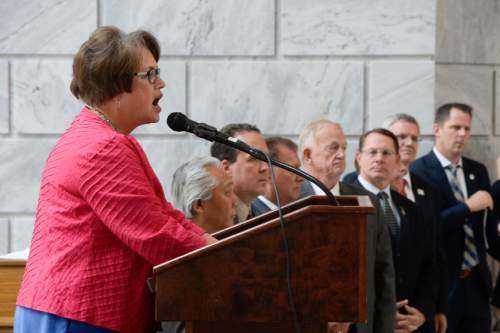This is an archived article that was published on sltrib.com in 2015, and information in the article may be outdated. It is provided only for personal research purposes and may not be reprinted.
Abortion in general, and Planned Parenthood in particular, are in the sights of Utah lawmakers ahead of the 2016 legislative session.
No bills have been drafted, but Republican Sens. Curt Bramble and Margaret Dayton on Wednesday laid out the blueprints of their proposals, which would permanently cut public funding to Planned Parenthood and ban nonemergency abortions at 20 weeks of pregnancy.
Dayton's measure would cement the governor's August order halting federal money from flowing to Planned Parenthood's Utah branch, and also block federal or state funding from any organization that promotes abortion. Dayton added that she has yet to drill down into specifics of how the state would monitor health care groups and determine whether they are promoting abortions.
"Our concern," the Orem senator said at a news conference at the Capitol, "is that taxpayer money is going to an organization that does provide and support abortions."
Dayton was flanked by about a dozen anti-abortion advocates, including local members of the state chapter of Knights of Columbus, a Catholic organization, and representatives from the conservative Utah Eagle Forum. "If we could run a bill that would repeal Roe v. Wade, we would," Bramble added from the dais, referring to the 1973 court case that legalized abortion. "There is a compelling state interest in protecting the vulnerable among us."
For his part, the Provo senator wants to see the procedure outlawed for nonemergency cases more than 20 weeks after conception, he said.
Bramble says, echoing lawmakers in the U.S. House, that fetuses can feel pain at that point.
Studies on that are limited and have not proven that pain can be felt at the 20-week mark, according to the American Congress of Obstetricians and Gynecologists.
Bramble successfully brought legislation in 2004 that banned state money from being used for abortions. He is drafting his 2016 proposal with an eye toward court cases in other states with similar legislation.
This summer, Wisconsin Gov. Scott Walker signed a 20-week ban into law, and West Virginia also has enacted one.
But Arizona's ban has been blocked by a federal appeals court that found it would violate a woman's constitutionally protected right to end a pregnancy before a fetus can survive outside the womb.
The U.S. Supreme Court effectively has left that decision in place by declining to take it up, a ruling affects Idaho and Nevada, which are in the 9th U.S. Circuit Court of Appeals' nine-state territory, but not Utah.
On Wednesday, Karrie Galloway, CEO of the Planned Parenthood Association of Utah, called the early proposals an "attempt, plain and simple, to score political points at the expense of the Utah women, men, and families who rely on Planned Parenthood for health care and education." Her organization's services still are continuing, she noted in a statement.
The local Planned Parenthood branch already is blocked from using federal or state money for abortions.
Dayton acknowledges her bill may be moot depending on the outcome of a lawsuit filed against the state by Planned Parenthood, which argues Utah Gov. Gary Herbert unfairly discriminated against it and harmed its reputation when he ordered its federal funding cut in August.
The directive from the Republican governor temporarily dammed the flow of about $270,000 in federal money to Galloway's operation, but a federal judge in October allowed it to keep the grants supporting reproductive education and STD-monitoring programs.
Planned Parenthood lawyers argued in court that the governor's political agenda fueled his decision to cut the funding.
But Herbert had cause to make the move, countered Tyler Green, a state attorney, because the Utah group was affiliated with the national organization at the center of the video controversy.
Herbert said he was reacting to what he called the casual nature and callousness shown in videos secretly recorded by an anti-abortion group. The footage showed national Planned Parenthood officials discussing procurement of fetal tissue for research.
The national group said the videos were heavily edited and later announced it would no longer accept reimbursement for the material.
After the Wednesday news conference, Dayton said she plans to target organizations that offer the procedure and those that give information about where women can go to have an abortion.
Such a measure would likely come in conflict with the constitutionally protected right to have an abortion and to free speech, said Marina Lowe, legislative and policy council for the American Civil Liberties Union of Utah.
"The devil will be in the details," Lowe said.
Salt Lake City Democratic Rep. Angela Romero said she couldn't comment without first reading text of the proposals, but added that she believes many Planned Parenthood services and programs, such as STD testing and lessons on safe sex, are "essential" for many.
"I came from a strong Catholic background, and if I truly believed in abortion, I wouldn't have had my son," who is now 19, she said. "But I can't make that decision for other women."
Crystal Painter, who was among the group of about 50 people that gathered for the news conference, disagreed.
"I think a lot of people are pro-life in their hearts," said Painter, a Catholic from Sandy, "but they're afraid to step out and do anything."
"Pro-life is just part of my faith," she said, and blocking money from going toward abortion is "for me, the ultimate goal."
Twitter: @anniebknox
The Associated Press contributed to this report.



